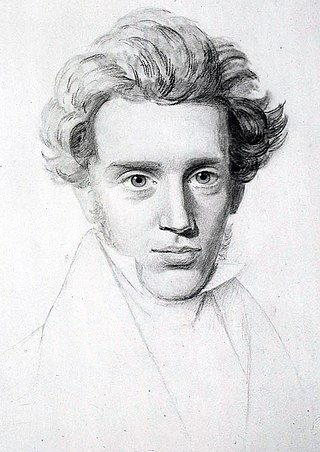
Søren Aabye Kierkegaard was a Danish theologian, philosopher, poet, social critic, and religious author who is widely considered to be the first existentialist philosopher. He wrote critical texts on organized religion, Christianity, morality, ethics, psychology, and the philosophy of religion, displaying a fondness for metaphor, irony, and parables. Much of his philosophical work deals with the issues of how one lives as a "single individual", giving priority to concrete human reality over abstract thinking and highlighting the importance of personal choice and commitment. He was against literary critics who defined idealist intellectuals and philosophers of his time, and thought that Swedenborg, Hegel, Fichte, Schelling, Schlegel, and Hans Christian Andersen were all "understood" far too quickly by "scholars."
Transcendentalism is a philosophical, spiritual, and literary movement that developed in the late 1820s and 1830s in the New England region of the United States. A core belief is in the inherent goodness of people and nature, and while society and its institutions have corrupted the purity of the individual, people are at their best when truly "self-reliant" and independent. Transcendentalists saw divine experience inherent in the everyday, rather than believing in a distant heaven. Transcendentalists saw physical and spiritual phenomena as part of dynamic processes rather than discrete entities.

Martin Buber was an Austrian-Jewish and Israeli philosopher best known for his philosophy of dialogue, a form of existentialism centered on the distinction between the I–Thou relationship and the I–It relationship. Born in Vienna, Buber came from a family of observant Jews, but broke with Jewish custom to pursue secular studies in philosophy. He produced writings about Zionism and worked with various bodies within the Zionist movement extensively over a nearly 50-year period spanning his time in Europe and the Near East. In 1923, Buber wrote his famous essay on existence, Ich und Du, and in 1925 he began translating the Hebrew Bible into the German language reflecting the patterns of the Hebrew language.
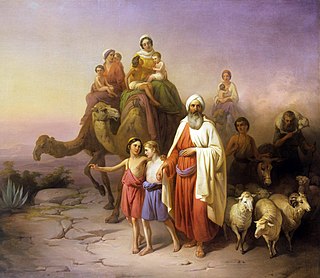
Fear and Trembling is a philosophical work by Søren Kierkegaard, published in 1843 under the pseudonym Johannes de silentio. The title is a reference to a line from Philippians 2:12, which says to "continue to work out your salvation with fear and trembling." The Philippians verse is sometimes thought to reference Psalm 55:5, which says, "Fear and trembling came upon me."

Charles Margrave Taylor is a Canadian philosopher from Montreal, Quebec, and professor emeritus at McGill University best known for his contributions to political philosophy, the philosophy of social science, the history of philosophy, and intellectual history. His work has earned him the Kyoto Prize, the Templeton Prize, the Berggruen Prize for Philosophy, and the John W. Kluge Prize.
Fideism is a term used to name a standpoint or an epistemological theory which maintains that faith is independent of reason, or that reason and faith are hostile to each other and faith is superior at arriving at particular truths. The word fideism comes from fides, the Latin word for faith, and literally means "faith-ism". Philosophers have identified a number of different forms of fideism. Strict fideists hold that reason has no place in discovering theological truths, while moderate fideists hold that though some truth can be known by reason, faith stands above reason.
John David Caputo is an American philosopher who is the Thomas J. Watson Professor of Religion Emeritus at Syracuse University and the David R. Cook Professor of Philosophy Emeritus at Villanova University. Caputo is a major figure associated with postmodern Christianity and continental philosophy of religion, as well as the founder of the theological movement known as weak theology. Much of Caputo's work focuses on hermeneutics, phenomenology, deconstruction, and theology.
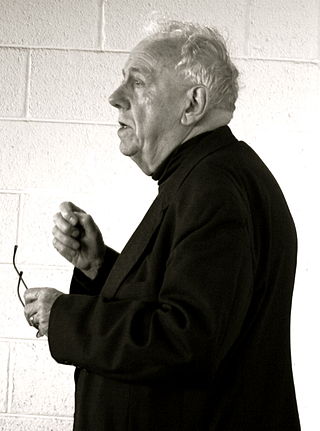
Alasdair Chalmers MacIntyre is a Scottish-American philosopher who has contributed to moral and political philosophy as well as history of philosophy and theology. MacIntyre's After Virtue (1981) is one of the most important works of Anglophone moral and political philosophy in the 20th century. He is senior research fellow at the Centre for Contemporary Aristotelian Studies in Ethics and Politics (CASEP) at London Metropolitan University, emeritus Professor of Philosophy at the University of Notre Dame, and permanent senior distinguished research fellow at the Notre Dame Center for Ethics and Culture. During his lengthy academic career, he also taught at Brandeis University, Duke University, Vanderbilt University, and Boston University.

Stanley Louis Cavell was an American philosopher. He was the Walter M. Cabot Professor of Aesthetics and the General Theory of Value at Harvard University. He worked in the fields of ethics, aesthetics, and ordinary language philosophy. As an interpreter, he produced influential works on Wittgenstein, Austin, Emerson, Thoreau, and Heidegger. His work is characterized by its conversational tone and frequent literary references.

Walter Arnold Kaufmann was a German-American philosopher, translator, and poet. A prolific author, he wrote extensively on a broad range of subjects, such as authenticity and death, moral philosophy and existentialism, theism and atheism, Christianity and Judaism, as well as philosophy and literature. He served more than 30 years as a professor at Princeton University.
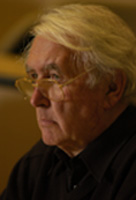
Dewi Zephaniah Phillips, known as D. Z. Phillips or simply DZ, was a Welsh philosopher. He was a leading proponent of the Wittgensteinian philosophy of religion. He had an academic career spanning five decades, and at the time of his death he held the Danforth Chair in Philosophy of Religion at Claremont Graduate University, California, and was Professor Emeritus of Philosophy at Swansea University.

Robert Merrihew Adams is an American analytic philosopher, specializing in metaphysics, philosophy of religion, ethics, and the history of early modern philosophy.
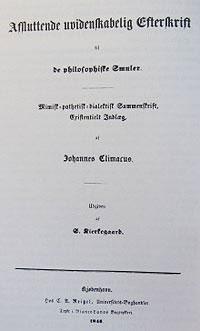
Concluding Unscientific Postscript to the Philosophical Fragments is a major work by Søren Kierkegaard. The work is an attack against Hegelianism, the philosophy of Hegel, and especially Hegel's Science of Logic. The work is also famous for its dictum, Subjectivity is Truth. It was an attack on what Kierkegaard saw as Hegel's deterministic philosophy. Against Hegel's system, Kierkegaard is often interpreted as taking the side of metaphysical libertarianism or free will, though it has been argued that an incompatibilist conception of free will is not essential to Kierkegaard's formulation of existentialism.
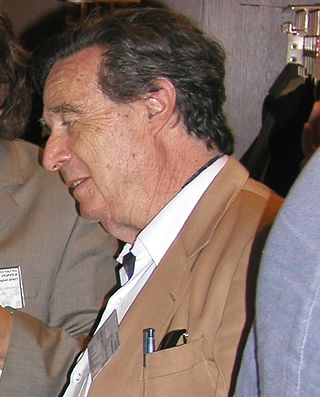
Joseph Agassi was an Israeli academic with contributions in logic, scientific method, and philosophy. He studied under Karl Popper and taught at the London School of Economics.
Stephen Mulhall is a British philosopher and Fellow of New College, Oxford. His main research areas are Ludwig Wittgenstein and post-Kantian philosophy.
This is a bibliography of works by and about the 19th-century philosopher Søren Kierkegaard.

Mark Dooley is an Irish philosopher, writer and newspaper columnist. A specialist in continental philosophy, theology and the philosophy of religion, he is the author of several books, including The Politics of Exodus: Kierkegaard's Ethics of Responsibility (2001), Roger Scruton: The Philosopher of Dover Beach (2009), and Why Be a Catholic? (2011).

Menachem Fisch is an Israeli philosopher. He is the Joseph and Ceil Mazer Professor Emeritus of History and Philosophy of Science, and co-Director of the Frankfurt-Tel Aviv Center for the Study of Religious and Interreligious Dynamics at Tel Aviv University. He is also Senior Fellow of the Goethe University's Forschungskolleg Humanwissenschaften, Bad Homburg.
Henry Bugbee was an American philosopher and professor. In his writing he explored a strain of existentialist thought with a distinctive emphasis on wilderness.
William Rothman is an American film theorist and critic. Since receiving his Ph.D. in philosophy from Harvard University in 1974, he has authored numerous books, including Hitchcock: The Murderous Gaze (1982), The “I” of the Camera: Essays in Film Criticism, History and Aesthetic (1988), and Tuitions and Intuitions: Essays at the Intersection of Film Criticism and Philosophy (2019). He was "part of a modern wave of thinkers to apply questions of philosophy to the medium of movies" during the 1980s, and his work contributed to the emergence of the sub-discipline that has come to be known as “film-philosophy.” Rothman has also written on aspects of film theory and on the writings of Stanley Cavell, an American philosopher who made film a major focus of his work. He is currently Professor of Cinematic Arts in the School of Communication at the University of Miami.












